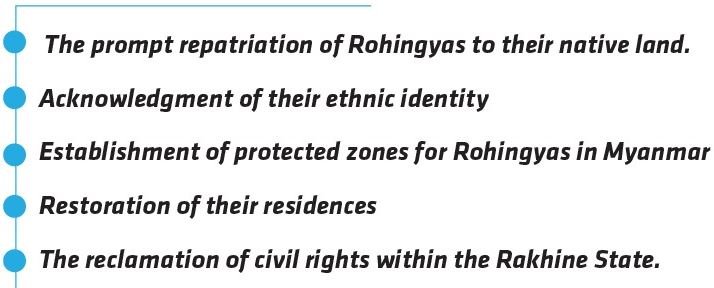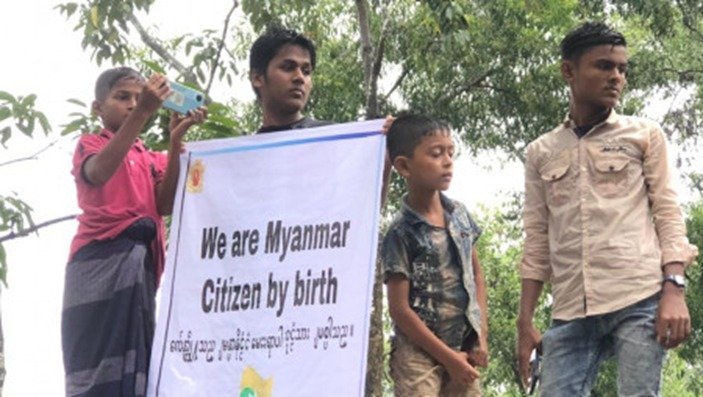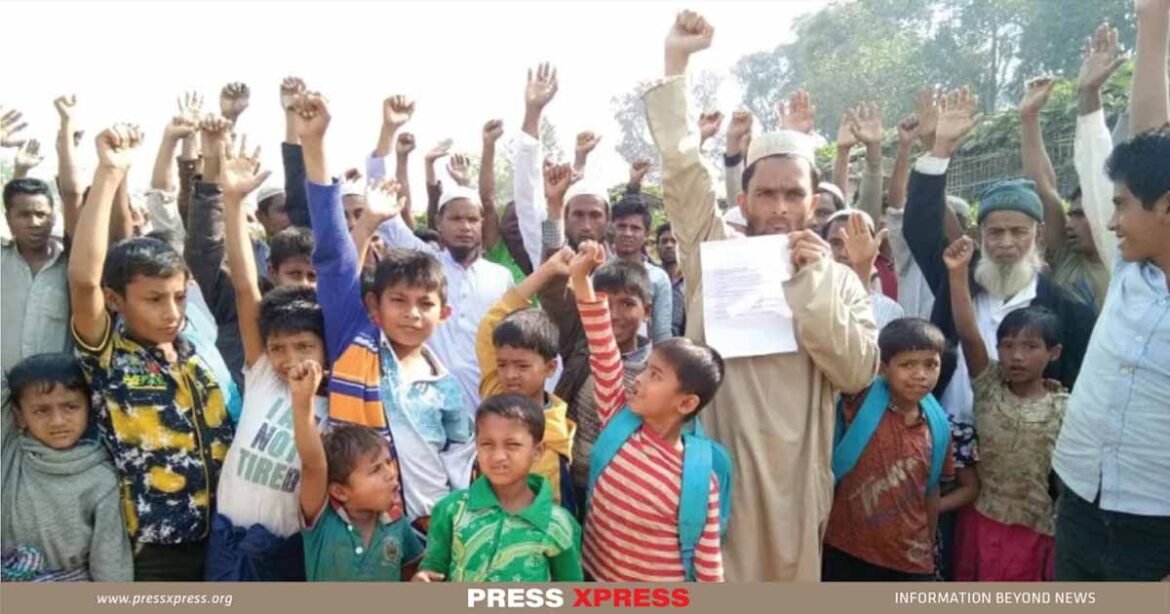An esteemed Australian scholar with expertise in regional geopolitics asserts that prioritizing geopolitical interests over humanitarian considerations may lead Myanmar to neglect repatriating the Rohingya population. In light of this, the scholar suggests that Bangladesh should explore an alternative approach or a “Plan B” regarding the Rohingya situation.
On Friday, a massive gathering of Rohingya refugees in Bangladesh, numbering in the tens of thousands, voiced their demand for repatriation to Myanmar. Their plea stems from the dire living conditions in the camps where they’ve resided following their escape from a violent military crackdown in 2017.
Over a million Rohingya people have been densely packed into the camps located in the southeastern part of Bangladesh, constituting the largest refugee settlement globally. The majority escaped the military crackdown led by Myanmar’s armed forces almost seven years ago, while a portion of them has resided there for an even longer duration.
You Can Also Read: OIC JOINS FORCES WITH HUMANITARIAN PARTNERS TO GARNER GLOBAL AID FOR ROHINGYAS AND HOSTS
The initial significant gathering took place within the camp on August 25, 2019, under the leadership of Master Muhibullah. Tragically, he was subsequently assassinated by members of the Myanmar extremist organization Arsa.
Amidst the Friday protests that spanned across the extensive camp area, refugees spanning various age groups displayed signs and vociferously chanted rallying cries.
Rohingya Refugees in Cox’s Bazar Gather for Prayers
In Ukhiya, a series of gatherings and prayer sessions were meticulously organized across 33 camps, all orchestrated by the Rohingya community. The activities commenced on Friday (25 August), drawing the enthusiastic involvement of numerous Rohingyas, children, and teenagers alike.
During these assemblies, the Rohingyas took part in supplications to Allah, seeking their homeland’s restoration.
“As individuals born as citizens of Myanmar, we, the Rohingya, had no choice but to flee to Bangladesh, driven by the urgent need to escape the atrocities of genocide and ethnic cleansing. The life we find ourselves in is that of refugees—a life we are determined to change. Our hearts are set on reclaiming our homeland, Myanmar, and we implore the international community to join hands in aiding our repatriation efforts,” the individuals speaking at the gatherings stated.
Kamal Hossain, the representative of the FDMN community, conveyed, “Our aspiration is to reclaim our homeland along with our rights, leaving behind the refugee existence that we no longer desire. We are resolute about returning to our native country to spend our lives there. It’s vital to recognize that we are citizens of Myanmar, not Bangladesh.”
“Regrettably, Myanmar is causing delays in the repatriation process. Unless repatriation commences promptly, we are prepared to return to Myanmar collectively, mirroring the way we arrived in Bangladesh,” he added.
Master Mohammad Jobair, the head of Arakan Rohingya Peace for Human Rights, put forth five key propositions during the assembly. These propositions encompass:

Why is Myanmar constantly delaying the repatriation of Rohingyas?
Bangladesh exhibited immense compassion by providing refuge to the Rohingyas escaping peril and devastation in their homeland. However, during the past seven years, Myanmar has shown no concrete action to indicate the potential return of the oppressed community.
The ongoing issue of law and order within the camps continues to pose a significant challenge for Bangladesh, especially given the deepening divides between the host community and the refugees. Furthermore, the focus on the Rohingya repatriation issue has been significantly displaced by Russia’s invasion of Ukraine, adding to the complexity of the situation.
Over the last few years, the cooperative efforts between Bangladesh, Myanmar, and China have shown minimal progress. Myanmar’s military authorities are currently focused on suppressing domestic discontent and tackling a growing insurgency, leaving little capacity to seriously address the Rohingya issue.
Despite the ICJ’s verdict on the Gambia’s case, endorsed by the Organization of Islamic Cooperation (OIC), which implicated the Myanmar government in acts of genocide against the Rohingyas, has had limited success in unsettling Naypyidaw.

Contradicting stands of China and India:
Within the Asian landscape, Myanmar’s strategic placement and its resource-rich nature are noteworthy. Hence, countries such as China, and to a limited extent, India, have considerable geopolitical stakes in the region.
Some ASEAN member countries and Japan have made substantial financial investments in Myanmar and are unwilling to gamble with those interests. This has led to a situation where the Myanmar military, after years of isolation, feels no pressure to deviate from its current trajectory and adopt a more refined approach.
There’s no question that China and Bangladesh share a friendship and collaborate extensively on development projects. Conversely, Myanmar’s geopolitical value surpasses these connections by a significant margin.
Regarding the repatriation of the Rohingya, one Chinese ambassador to Bangladesh mentioned that the process might be delayed due to internal issues within Myanmar. As a result, the Rohingyas could potentially face an extended period before they can return.
Reliable sources suggest that internal unrest within Myanmar continues unabated, as insurgent groups grow in both influence and territory.
India’s strong connections with Bangladesh, rooted in history and geography, contrast with its multifaceted geopolitical and security considerations regarding Myanmar. Delhi is reluctant to compromise this by overburdening Myanmar with excessive demands for the repatriation of the Rohingyas from Bangladesh.
A respected scholar from Australia, well-versed in regional geopolitics, holds a firm belief that if geopolitics outweighs human concerns, Myanmar will likely feel no obligation to repatriate the Rohingyas. He holds a strong conviction that the Rohingyas’ presence is becoming a permanent reality and underscores the profound extent of fear and anxiety within the Rohingya community. Given this perspective, he suggests that Bangladesh should consider an alternative approach, or what could be termed a “Plan B.”
To conclude, considering the current pace observed in Myanmar, it could potentially require an entire decade for the Rohingya population to return, a situation that is absolutely untenable. While keeping the humanitarian perspective in mind—highlighting the necessity for ensuring secure conditions for the Rohingya’s repatriation—it’s imperative to exert influence on Myanmar’s authorities to accelerate the fulfillment of these prerequisites and expedite the repatriation procedure.


